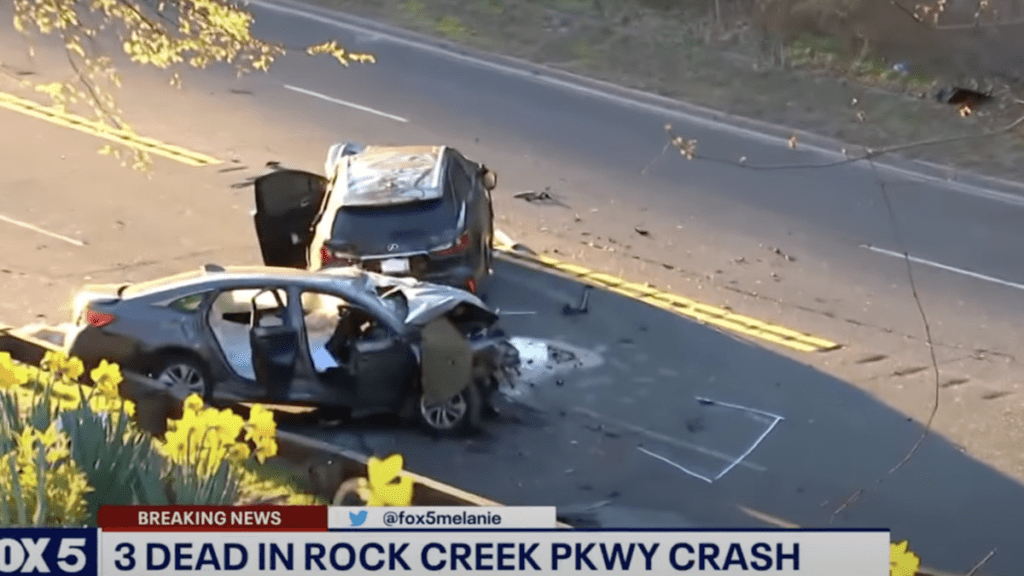Car in Catastrophic Crash Racked Up 43 Speeding Tickets in Just 10 Months

Three people are dead after the driver of a Lexus SUV ran from a traffic stop and slammed into a Honda serving as a ride share at high-speed outside of Washington D.C. last week. It turns out, the Lexus had been on a rampage for the last year, racking up over $12,000 in traffic tickets in just 10 months. So, how were they able to stay on the road?
The crash occurred around 1:40 a.m. on Rock Creek Parkway in northwest D.C. The victims include two friends who were out for a fun night on the town and the Lyft driver giving them a ride home. Police attempted a traffic stop on the Lexus SUV, which fled the stop. While police did not pursue the fleeing vehicle, it still continued at a high rate of speed before slamming into the Honda. The occupants of the SUV, a man and woman, were taken to the hospital where the woman remains in critical condition.
3 dead, 2 hurt in Rock Creek Parkway crash | FOX 5 DC
While police have yet to determine a cause for the crash it quickly became obvious to local reporters that this Lexus had an extensive wrap sheet, with 44 unpaid parking tickets—43 for speeding and one for running a red light—all received in the last 10 months:
So how was this driver able to stay on the road? Slate has a really good break down of what happened:
Washington, D.C.’s speed cameras are terrific at generating revenue—$87 million the past fiscal year. And studies nationwide show that the very existence of traffic cameras makes roads safer; in Chicago, for example, it’s estimated that traffic cameras averted 204 crashes over a three-year period. But in D.C., as in many cities, the tangled bureaucracy that operates traffic cameras is not very good at using that data to get rampaging drivers out of their cars. As local reporter Martin Austermuhle points out, three separate agencies are involved with the city’s traffic cameras: the Department of Transportation manages the devices, DMV handles fines, and Department of Public Works employees are the ones tasked with booting and towing cars with outstanding tickets. (As of 2021, there were four such employees.) And because traffic cameras don’t capture faces, only license plates, penalties are not levied on drivers’ licenses for even the most egregious camera-caught behavior—only on the cars themselves.
As in many U.S. cities, Washington, D.C.’s “Vision Zero” program to eliminate road fatalities is an abject failure. Since the program’s launch in 2015, traffic deaths in the city have gone up; Vision Zero has been chronically underfunded, understaffed, and ignored, according to a report released this week by the city’s auditor. To come anywhere near success on an ambitious program like this would require major investments in infrastructure—for instance, redesigning high-speed roads like Rock Creek Parkway. It would require investments in staffing for the teams that, for instance, boot the cars of scofflaws.
But it would also require acknowledging an obvious fact: It should be the city’s top priority to get rampaging drivers off the roads, quickly. You have the data to identify cars that, for some reason, are being driven wildly unsafely, month after month. Indeed, the city government “think tank,” the Lab, is instituting a pilot program to identify the owners of those cars and … uh … send them “customized messages, which may include information about their previous violations and predicted risk of a fatal crash.”
G/O Media may get a commission
Indeed, Vision Zero has been a failure across the U.S.—except in Jersey City, of all places—due to lack of political will and funding to make streets safer. With the final traffic deaths total predicted to rise yet again for 2022 to around 46,000, Americans seem to have largely accepted death on the roads as a fact of life. Driving is getting safer around the world in developed countries, except in the U.S.
Read the whole story at Slate here.



